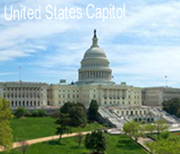FREE NEWS LINKS

HOME SEARCH
Updates & changes ongoing ....
---- Although this site is https-secure, we cannot guarantee that it or any provided links are safe; be sure your antivirus and other security systems are up to date.
Undated: Congressional oversight is oversight by the United States Congress over the Executive Branch, including the numerous U.S. federal agencies. Congressional oversight includes the review, monitoring, and supervision of federal agencies, programs, activities, and policy implementation.[1] Congress exercises this power largely through its congressional committee system. Oversight also occurs in a wide variety of congressional activities and contexts. These include authorization, appropriations, investigative, and legislative hearings by standing committees; specialized investigations by select committees; and reviews and studies by congressional support agencies and staff.
Congress’s oversight authority derives from its “implied” powers in the Constitution, public laws, and House and Senate rules.
Congressional oversight is an integral part of the American system of checks and balances.
Back to top
Oversight also derives from the many and varied express powers of the Congress in the Constitution. It is implied in the legislature's authority, among other powers and duties, to appropriate funds, enact laws, raise and support armies, provide for a Navy, declare war, and impeach and remove from office the President, Vice President, and other civil officers. Congress could not reasonably or responsibly exercise these powers without knowing what the executive was doing; how programs were being administered, by whom, and at what cost; and whether officials were obeying the law and complying with legislative intent.
The Supreme Court of the United States has confirmed the oversight powers of Congress, subject to constitutional safeguards for civil liberties, on several occasions. In 1927, for instance, the Court found that in investigating the administration of the Justice Department, Congress had the authority to consider a subject "on which legislation could be had or would be materially aided by the information which the investigation was calculated to elicit".[4]
https://en.wikipedia.org/wiki/Congressional_oversight
Back to top
-- 2019 --
May 26: The President of the United States is erratic, illiterate, and doesn’t want to know what he doesn’t know. The President has alienated former allies, befriended or courted murderous dictators, and has repeatedly brought the country to the brink of nuclear confrontation. The President lies constantly, knows that he is lying, and demands that Administration officials lie for him, and often they do. The President has waged war on the institutions of government, overseeing the gutting of the State Department and the destruction of other federal agencies by their own leaders, and effectively shut off media access to the Pentagon, the State Department, and the White House. The President has acted to thwart oversight of the Administration by other branches of government. The President has never made a secret of despising the government itself: he has called it a “swamp” and gleefully shut it down for thirty-five days, during a temper tantrum. The President has not only failed to divest himself of his businesses but has installed his children in and near the White House, openly using his office for personal financial gain. The President has debased political culture and language, using his bully pulpit to spew lies, hate, and personal insults
https://www.newyorker.com/news/our-columnists/how-nancy-pelosis-tactics-affirm-the-trumpian-style-of-politics
Webpage visitor counts provided by